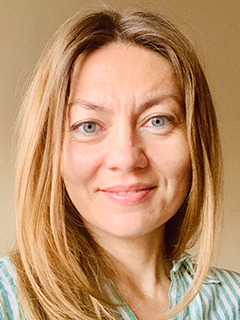HOW CAN WE HELP YOU? Call 1-800-TRY-CHOP
In This Section
AACR Academy Fellow, COVID-19 Vaccine, Underinsured Children, Cancer Tissue Function

Children's Hospital of Philadelphia childhood cancer expert John Maris, MD, receives prestigious recognition from the American Association for Cancer Research Academy, investigators lead the way with new findings on the effects of COVID-19 vaccination on long COVID and severe illness in children, identify children and families most likely to be underinsured, and develop an algorithm to listen in on how cellular communities talk to each other.
Renowned CHOP Pediatric Oncologist Named 2024 Fellow of the AACR Academy
John Maris, MD, the Giulio D'Angio Endowed Chair in Neuroblastoma Research at CHOP, was recognized by the American Association for Cancer Research (AACR) Academy for his research resulting in the discovery of the genetic basis of neuroblastoma, a common childhood cancer.
Each year, the AACR Academy honors esteemed scientists whose major contributions have propelled significant innovation and progress against cancer.
Dr. Maris's work in explaining neuroblastoma's molecular pathogenesis, development of novel methods for immunotherapy target discovery, and the establishment of anti-tumor peptide-centric chimeric antigen receptors across multiple human leukocyte antigen alleles in neuroblastoma — overcoming the challenge of targeting intracellular proteins — were also contributing factors for this award.
Fellows of the AACR Academy serve as a global brain trust of top contributors to cancer science and medicine who help advance the mission of the AACR to prevent and cure all cancers through research, education, communication, collaboration, science policy and advocacy, and funding for cancer research. They will be formally inducted during the AACR Annual Meeting to be held April 5-10 in San Diego.
See this news release for more information.
COVID-19 Vaccine Reduces Long COVID in Children
CHOP researchers led work that found vaccination provides moderate protection against long COVID in children. The findings of the large retrospective study, based on electronic health records analyzed as part of the National Institutes of Health's Researching COVID to Enhance Recovery (RECOVER) initiative, also demonstrated that vaccination has a stronger effect with adolescents, who have a higher risk of developing long COVID than young children.
"This study provides us with important data showing the protective effects of the vaccine against long-haul COVID and suggests that this protection is mostly from preventing visible infections," said senior author Charles Bailey, MD, PhD, co-principal investigator for the PEDSnet and RECOVER/PCORnet EHR Coordinating Centers in the Applied Clinical Research Center at CHOP. "We hope this means that as vaccines are improved to be more effective against current strains of SARS-CoV-2, their protection against long COVID will get better, too."
Using data from PEDSnet, a national network of pediatric medical centers, researchers evaluated data from 17 health systems in the United States to assess vaccine effectiveness against long COVID in two groups of patients between 5 and 11-years-old and 12 and 17-years-old, respectively, as well as the time period in which patients were impacted. The vaccination rate was 67% in the cohort of 1,037,936 children.
The study estimated effectiveness of the vaccine within 12 months of administration as 35.4% against probable long COVID and 41.7% against diagnosed long COVID. The estimate was higher in adolescents compared with younger children (50.3% vs. 23.8%), and higher at six months (61.4%) but decreased to 10.6% at 18 months. Children vaccinated after recovering from COVID-19 demonstrated vaccine effectiveness of 46% against probable long COVID after a subsequent episode of COVID-19.
The journal Pediatrics published the study. Learn more in this CHOP news release.
Severe COVID-19 Illness Lower in Vaccinated Children
A COVID-related study assessed the effectiveness of the BNT162b2 vaccine in preventing infection and severe diseases with various strains of the SARS-CoV-2 virus in previously uninfected children and adolescents.
Co-led by Christopher Forrest, MD, PhD, principal investigator, PEDSnet Clinical Research Network, and director, Center for Applied Clinical Research at CHOP, the researchers conducted one of the largest real-world COVID-19 vaccine studies of children and adolescents in the United States using PEDSnet. The data source provides a picture of the vaccine's effectiveness beyond controlled trial conditions, in the real world of doctor and emergency room visits.
A health record analysis of 250,000 patients, half of whom had received at least one dose of the BNT162b2 vaccine, showed that risk of infection and severe illness was significantly lower for those who were vaccinated, and cardiac conditions did not increase.
When the Delta variant rose to prominence, vaccinated adolescents, defined as people ages 12 to 20 years, were 98% less likely to be infected than their unvaccinated peers; data indicated a slight decline in effectiveness when the Omicron variant became dominant.
"Although the pandemic has been declared over, the risk of COVID-19 is present throughout U.S. communities," said Dr. Forrest, a professor of Pediatrics at the University of Pennsylvania. "Thus, more information is needed on effectiveness of vaccination delivered to children and adolescents during more recent time periods."
The findings appear in Annals of Internal Medicine. Read more in this news release.
Children With Special Health Care Needs More Likely to be Underinsured

Asiya Validova, PhD
PolicyLab researchers found that children with special health care needs, particularly from middle-income families, are more likely to be underinsured, meaning they have inadequate or inconsistent health coverage. The more severe a child's special health care needs, the less likely they are to be adequately insured.
Between 2016 and 2021, 70,431 children ages 0 to 17 years (32.3% of the total sample of 218,621) were underinsured, 47,057 (17.9%) of whom had special health care needs. The researchers assessed varied health care need categories (e.g., physical, mental, or behavioral health conditions, complex conditions, and functional limitations), demographics, and income levels.
First and corresponding author Asiya Validova, PhD, a postdoctoral research fellow working with Meredith Matone, DrPH, MHS, discussed the findings in this video.
The study appeared in JAMA Network Open. A related commentary suggests policy options to target gaps in insurance coverage.
In the Neighborhbood of Cellular Therapy
CHOP researchers developed a new AI-powered algorithm to help understand how different cells organize themselves into particular tissues and communicate with one another. The study team evaluated the tool, called CytoCommunity, on tissue samples from breast and colorectal tumors to reveal how so-called tissue cellular neighborhoods interact with one another to evade therapy.
Kai Tan, PhD, a scientist in the Center for Childhood Cancer Research at CHOP and senior study author, credits recent advances in spatial omics technology that make it possible to spatially characterize thousands of genes across a piece of tissue that could be home to hundreds of thousands of cells and their respective genes. Future studies could reveal more information about the function of these cells in the tumor microenvironment.
"The next step is to apply this algorithm to both healthy and diseased tissue data generated by research consortia such as the Human BioMolecular Atlas Program and Human Tumor Atlas Network," said Dr. Tan, professor in the Department of Pediatrics and the Perelman School of Medicine at the University of Pennsylvania.
Nature Methods published the findings. Learn more in the CHOP news release.
ICYMI
Catch up on our headlines from our Jan. 5 In the News:
- CHOP Research Provided Foundation for New Gene Therapy Approved by Health Canada to Treat Hemophilia B
- CHOP-led Review of 22q11.2 Deletion Syndrome Distinguished as Editor's Choice
- Three CHOP Physician Scientists Honored for Contributions to Excellence in Medicine
- Researchers Identify Previously Under-defined Role of Transit-Amplifying Intestinal Cells
- Machine Learning Models Offer Better Predictions for Neurologic Outcomes
Keep up with our news, stories, and updates in real time by following us on X, Facebook, LinkedIn, or Instagram. Meet the minds behind the science in the Bench to Bedside podcast. Or subscribe to our newsletter to receive an email every other Friday by signing up here.






